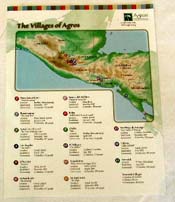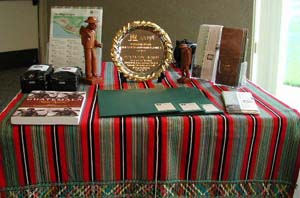|
The Long Road to Trapichitos
A program on the BBRC’s involvement in International projects was keyed by Club Service I Director Steve Lingenbrink. But, as he pointed out, a vacancy created by a member leaving the club paved the way for him to become the chair of World Community Service committee. “We have been supporting Agros in its effort to break the cycle of poverty and create a cycle of change—Agros’ motto. In my new role, it seemed logical if I should go to Trapichitos to see the village that we’re helping to support.”
Steve did just that, adding to his other international visits in tandem with Mike Hyodo in Romania and Russia.
 Trapichitos is a village of 80 homes, 4500 feet in the mountains of the Central American country of Guatemala. Racked by a vicious 36-year civil war, the people are in the grip of terrible poverty. A cease-fire in 1996 brought the fighting to an end, but current reports say the attempt at democracy is threatened by a return of human rights abuses. Trapichitos is a village of 80 homes, 4500 feet in the mountains of the Central American country of Guatemala. Racked by a vicious 36-year civil war, the people are in the grip of terrible poverty. A cease-fire in 1996 brought the fighting to an end, but current reports say the attempt at democracy is threatened by a return of human rights abuses.
In this atmosphere, Lingenbrink joined a group of Americans sponsored by Agros to visit the village of Trapichitos. “After arriving in Guatemala City, we visited three Rotary Clubs, each indicating an interest in partnering on future projects. Then, we began our trek to the countryside, where we learned how long the road is to Trapichitos.”
Most of the villages are perched atop mountains….there are no roads for vehicles here. Our goal is to reach the village the BBRC has supported with funds…nearly $8000, $3100 given earlier this year to help rebuild the village’s community center. Steve’s description of what happened showed the emotion connected with this trip. “One of the villagers volunteered to paint the interior of the building. However, fumes built up and there was an explosion, which killed the man. The people put the accident under suspicious and wouldn’t go near the place. A work crew from the Sammamish Presbyterian church has cleaned up the site, readying for rebuilding. The healing process has begun and they’re moving forward.”
The school in the village accommodates youngsters through sixth grade. The Rotary Club in Guatemala City would like to help in the education of the young people. They have a mobile education unit, which would help extend their education through high school.
Early construction of the village was done in wood, which was susceptible to insects and weather-related dry-rot. Now, they build with cinderblocks, which are carried up the mountain on the backs of dedicated villagers. There are no roads to Trapichitos.
The people are of Mayan Indian descent, targets of the civil unrest for over three decades. The kids are learning Spanish while their elders cling to the Mayan language. There’s another village nearby named Xeucalvitz – which translates “Half way up the mountain.” Steve and the group hiked another 2000 feet to this new village, which is considering an Agros project. It’s at 6500 feet elevation. The Agros group hiked to meet with the tribal council. They listened to a three-hour presentation of what the village would like to do. It was a 15-point plan of how they’d improve their village. There’s 600 acres of beautiful land that is privately owned and can be bought for $60,000 US. There’s a plentiful water source and has bananas growing and would make good coffee growing. The world has never seen a model that’s as complete as the Agros model – a seven-year project, helping the people break out of the cycle of poverty.
 Agros Founder Skip Li returned to share the lectern with Lingenbrink. He visited the BBRC back in 2001, describing how the organization is serving the needs of over 20 villages in Central America. Skip is an attorney in Seattle. Agros Founder Skip Li returned to share the lectern with Lingenbrink. He visited the BBRC back in 2001, describing how the organization is serving the needs of over 20 villages in Central America. Skip is an attorney in Seattle.
“The 80 families of Trapichitos were people downtrodden before, depressed when I first met them. Now, two years later, it’s obvious what a difference makes. They have a future, a house, a school, rising out of poverty and oppression. They’ll look you in eye….no more downcast eyes. The kids, who were so shy before, run up and hold your hand.”
“Guatemala is an enchanting land….my heart aches for the land and its people. I lived in Guatemala for 3 years back in 1982 and, frankly, I’m bewitched by the country. The climate produces 3 crops a year. The people will rise out of their poverty. Their hearts are huge and they are giants in their work.”
Li said there’s been some private land reform, while public land reform has been a total failure. Corruption has taken the money the US has given in the past. Agros is not dependent on government. We buy the land at market prices and implement our model with the villages with whom we partner. Our model begins with the land, agricultural training, clean water, schools, access to healthcare, and houses. It includes repayment. We expect the village to repay the cost of the land and buildings. And finally, there is replication. Our goal is to take our model to as many places as we can. We are a faith-based organization. Our job is to help the rural poor…to assist them to market their crops. We encourage them to experiment with new crops. One such example is carrots. They had never seen a carrot until we arrived on the scene. The people have become self-sufficient. In 2001, we had project in 14 villages. That number is up to 20 now. The World Bank has given us an award for helping to combat poverty. We are privileged to have donors from all over the country and grants from foundations….anonymous gifts.”
 As far a replication goes, we plan to take the Agros plan to 1000 villages by the year 2020. “We got our name from the word ‘miracle’. Millagros means ‘a thousand miracles’ and that’s our goal. As far a replication goes, we plan to take the Agros plan to 1000 villages by the year 2020. “We got our name from the word ‘miracle’. Millagros means ‘a thousand miracles’ and that’s our goal.
Founder Li said “Agros is not just buildings, awards, or organizations, -- it’s people who break out of their routines, their comfort zone and literally go to beyond the end of the road. What they learn is to experience first hand what’s like to give a helping hand and to develop a friendship with these wonderful people.”
In a question before the meeting closed, Skip was asked about the situation in Guatemala.
“After the peace treaty was signed, the country started down the road to democracy. Officials were democratically elected. The government is there, but there’s a lot of lawlessness. Land is privately owned, by the government and by private individuals. There are rights of private ownership. But, you will be bewildered by their land title system. Indians were cheated out of their land. Agros does due diligence prior to purchase … and registers the land properly.”
“I hope others of you will take this opportunity. Since 9/11, there’s a great sense of urgency in the US to bridge the enormous gap … some people absolutely hate us….but through our efforts at Agros, we can make the difference. Our fondest dream is to work in other Latin American countries …Mexico, Honduras, El Salvador. Agros and Rotary is a perfect match!”
Both Lingenbrink and Li received certificates that 240 doses of polio vaccine have been donated in their name toward Rotary’s quest to eradicate the disease.
|